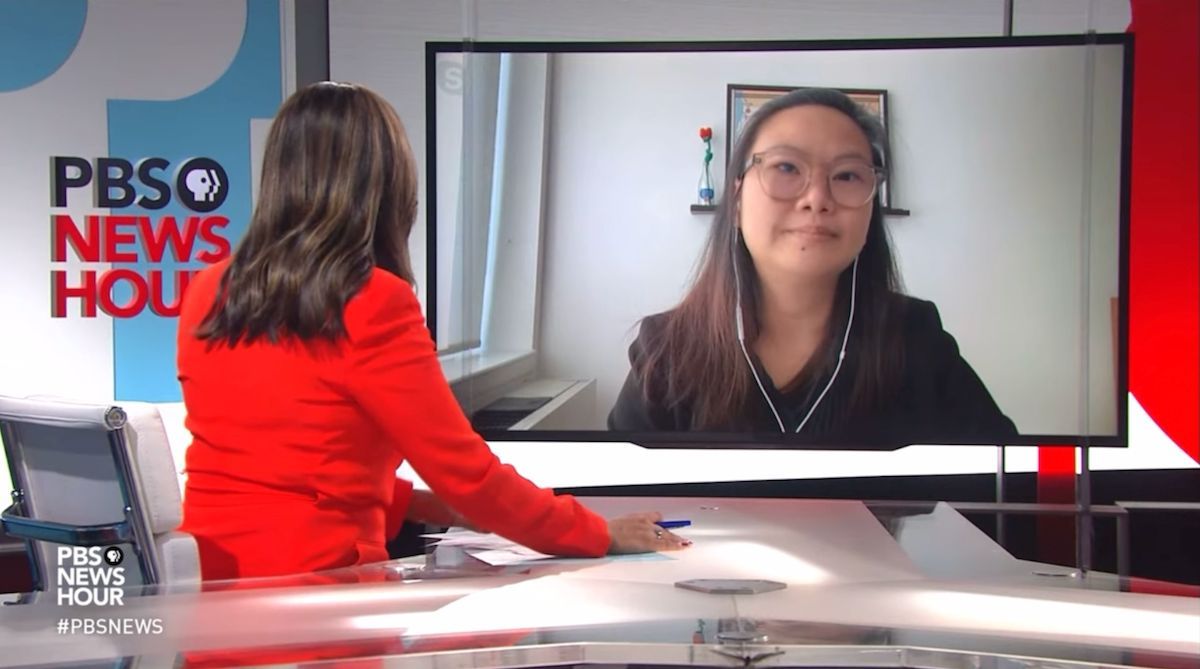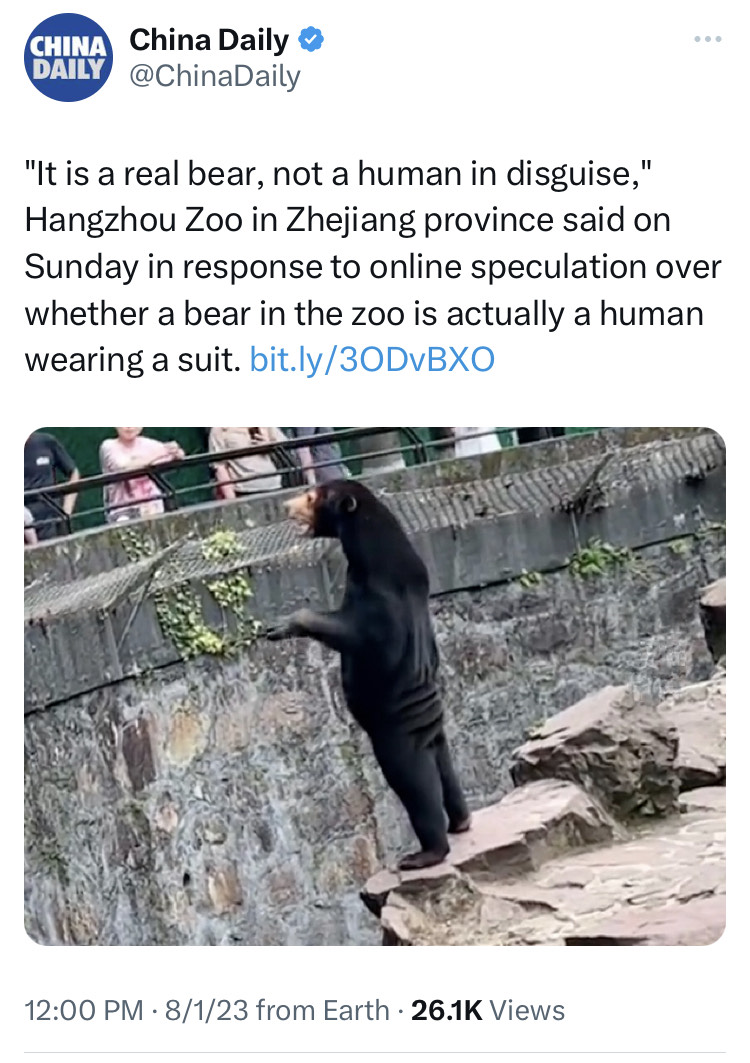| | | | Dear Friends, Affirmative action is a complex topic and on Wednesday, August 9, 2023, the 1990 Institute's Executive Director, Susana Liu-Hedberg, participated in an interview on PBS NewsHour with Amna Nawaz. Susana highlighted the Pew Research Center’s findings that Asian Americans have mixed views on affirmative action and the importance of uplifting the many diverse ethnicities under the Asian American umbrella, composed of people who have their own varied lived experiences. Susana said, "Affirmative action didn't need to be struck down. But it did need to be fixed." Scroll down to our Spotlight section below for more information from the PBS NewsHour story and see 1990 Institute’s full statement on the Supreme Court ruling on affirmative action on our website. Whether you love to play mahjong or are new to this classic Chinese game, learning about mahjong is a fun way to explore cultures, Asian American history, and math. Watch our video called “Beyond the Tiles: Making Connections Through Mahjong” and be sure to enter our giveaway of a set of mahjong tiles or cards on social media. In case you missed it, one of our posts on the exclusion faced by immigrants to the U.S. from Asia has been viewed close to 32,000 times. Be sure to follow us on social media so you don’t miss a thing – see the links in the footer of every newsletter. And if you love our resources and content, please donate to help us continue, and please share this newsletter with your friends and family and encourage them to subscribe. Help is needed in Hawaii due to the devastating wildfires in Maui and the Big Island. If you’re able to give, please consider the Hawai‘i Community Foundation’s Maui Strong Fund or find another way to support relief efforts here. |
| |  |
|
| | | Is Qixi our immigrant community love story? By Frances Kai-Hwa Wang
The Qixi festival or Chinese Valentine’s Day commemorates the love story of Niulang, the cowherd, represented by the star Altair, and Zhinü, the weaver maiden, represented by the star Vega. Zhinü was the youngest of seven sister goddesses who wove the night sky on their looms every night. One day, the cowherd’s old cow spoke and told Niulang that the seven goddesses would fly down to earth to bathe in a nearby spring, and if Niulang stole one of their gowns while they were bathing, that goddess would not be able to fly back to heaven and would be forced to stay on Earth in mortal form. Niulang stole the gown with the finest embroidery, and all the goddesses but the youngest flew away. At first, Zhinü was frightened and cried for the loss of her sisters, but the cowherd was kind and they eventually fell in love, married, and had two children, a boy and a girl. However, without Zhinü’s talents at the loom, her six sisters could not finish weaving the night sky every night, and so the nights became shorter and the days became longer. As a result, the people’s crops could not grow well and there were famines across the earth. The Jade Emperor called for Zhinü to return to her duties in heaven. When Zhinü was taken back to heaven, the old cow told Niulang that he could kill him and use his magical cowhide to fly to the heavens too. The Queen Mother of the West saw Niulang flying after Zhinü and created a silver river, now known as the Milky Way, to forever separate the two lovers. After seeing the grief of the separated couple, all the magpies of the world felt empathy and flew up to create a bridge across the Milky Way so that the cowherd, the weaver maiden, and their two children could be reunited for one day each year, the seventh day of the seventh lunar month. This year the Qixi festival falls on August 22. I first learned of this story years ago when I was researching Valentine’s Day (February 14) traditions in China. At the time, many young people in China celebrated the western holiday with fancy romantic dinner dates at Pizza Hut. Although the Qixi festival is often referred to as Chinese Valentine’s Day, it goes far beyond the romantic love of a young couple. It is a love that encompasses duty, family, hard work, kindness, and empathy for others. I do not like the way that the weaver maiden is said to fall in love with her peeping Tom captor, but I love the way that all the magpies of the world come together in empathy to help this family come back together after duty and work have separated them. It feels familiar, like an immigrant community love story. Afterwards, as the weaver maiden goes back to her work of weaving the night sky every night, her tears of loneliness and longing fall onto the fabric and she simply weaves them in, like so many of us separated from our loved ones, creating the glistening stars in the sky. |
| |
|
| | Asian American workers could be the most heavily affected by AI | NBC News Asian Americans and women in the workforce are the most concentrated in fields where AI could assist or replace their job tasks, according to new research. Randall Park says meaningful representation can feel like the ‘airing of dirty laundry’ | NBC News Park discusses his directorial debut, “Shortcomings,” which opens Friday, and the urgency of the ongoing Hollywood actors strike. Inside the Cynical Campaign to Claim That Affirmative Action Hurts Asian Americans | The Nation The architect of the attacks on affirmative action has pitted Asian Americans and Black Americans against each other – letting white folks off the hook. Michigan agency fills adult caregiving gaps for Asian American families | Bridge Michigan Asian Americans are nearly twice as likely as the general population to care for an older adult because of cultural norms and difficulty finding suitable caregivers. One agency is trying to fill the gap in Michigan. Beijing records heaviest rainfall in 140 years, severe flooding and 21 deaths | PBS NewsHour China’s capital has recorded its heaviest rainfall in at least 140 years after Typhoon Doksuri. China dominates the EV battery industry. Can the rest of the world catch up? | NPR China is dominant in every aspect of electric vehicle battery technology. Now the rest of the world is trying to catch up. Can China’s second-gen factory owners give ‘made in China’ a second chance in crisis? | South China Morning Post The generation that made China a manufacturing powerhouse is being aged off the job, heaping responsibilities on often-unprepared offspring – but their fresh ideas may just save the industry. Where did 20,000 Jews hide from the Holocaust? In Shanghai | NPR An exhibit in New York explores a little-known chapter of World War II. 70 years later, Koreans are still working to formally end the Korean War | NBC News In commemoration of the 70th anniversary of the Korean War Armistice, hundreds of advocates are mobilizing in Washington to push for an official effective end of the conflict. Viral video sheds light on dangers faced by sun bears | CNN A viral video is raising awareness about one of Asia's most endangered and intriguing animals: the sun bear. Biden administration announces new bans on investments in China meant to protect national security | CNN New restrictions are expected on investments by U.S. private equity and venture capital firms, as well as joint ventures, in Chinese artificial intelligence, quantum computing, and semiconductors. Top administration officials have described the rules as limited in scope, intended not to damage China’s economy but instead to protect American national security. |
| | | |
|
| | - WATCH 1990 INSTITUTE’S EXECUTIVE DIRECTOR DISCUSS AFFIRMATIVE ACTION IN COLLEGE ADMISSIONS ON PBS NEWSHOUR – On August 9, the Executive Director of the 1990 Institute, Susana Liui-Hedberg, was interviewed by Amna Nawaz on PBS NewsHour in a news story on the end of affirmative action in college admissions. Susana spoke about the wide diversity of the Asian American population as a counterpoint to the "model minority" myth and the description of the population as monolithic. When data is disaggregated, the "model minority" myth is exposed as false, revealing the different lived experiences of Asian Americans. She emphasized that “diversity remains incredibly important in any learning environment. … This issue was and it remains a complex one. The two cases [brought by Students for Fair Admissions against Harvard and the University of North Carolina] and the ruling tied two mutually exclusive things together. On the one hand, we acknowledge that there needs to be some mechanism in place to support students that have been historically marginalized and underrepresented to ensure equity in access to higher education. But, on the other hand, if … admissions are based on one certain criteria, like race, then that does become discriminatory. Now, affirmative action didn't need to be struck down. But it did need to be fixed. The law, like many other of our laws, is – it's not perfect." The PBS NewsHour story also included Asian American students‘ opinions on the recent U.S. Supreme Court ruling and a conversation with Janelle Wong, Director of the Asian American Studies Program at University of Maryland.
If you would like to support our nonprofit, a donation of any size will allow us to continue to support complex issues affecting the AAPI community and help teachers implement AAPI/ethnic studies and disrupt the way that we teach and share stories about AAPI communities and the long history of U.S.-China relations.
- DISCOVER HOW MAHJONG BRINGS COMMUNITIES TOGETHER IN “BEYOND THE TILES: MAKING CONNECTIONS THROUGH MAHJONG” AND ENTER OUR GIVEAWAY – The 1990 Institute’s educational video, “Beyond the Tiles: Making Connections Through Mahjong,” reveals the history of mahjong, how the game came to the U.S., and how it transcends perceived differences and boundaries of geography, ethnicity, gender, culture, and generations, acting as a unifying force among diverse groups today. To celebrate the launch of the video and to support teachers using mahjong as a fun way for students to practice their math skills, we are holding a giveaway of a set of mahjong tiles or cards. For a chance to win, send a direct message on social media including a math problem featuring mahjong. Learn more on our website. Visit our Reference Library for resources, including a downloadable lesson guide, links to movies and books featuring mahjong, and more.
- LEARN ABOUT THE HISTORY OF IMMIGRATION FROM ASIA TO THE U.S. IN SMALLER BITES – We received very positive feedback from teachers for our foundational video on the history of immigration from Asia to the U.S. called “Waves of Immigrants: The Asian American Journey.” For teachers, students, and others who prefer to review this complex topic in smaller sections, we created eight reels, around one minute each. They have proved very popular on social media – Part 5, which reviews the Chinese Exclusion Act and the Supreme Court birthright citizenship case of United States v. Wong Kim Ark, has been viewed 31,800 times to date with thousands of “likes.” You can watch the rest on Instagram: Part 1, Part 2, Part 3, Part 4, Part 6, Part 7, and Part 8. Drop a comment and let us know what you think of our short videos and follow us on social media to be the first to see all our bite size videos with topics relevant to U.S.-China relations and Asian American and Pacific Islander issues.
|
| | Dim Sum - A Little Bit of Heart |
|  | |
|
|
|
| | | | 1990 Institute
P.O. Box 383 | San Francisco, California 94104
contact@1990institute.org www.1990institute.org Copyright 2023 The 1990 Institute. All rights reserved. |
| | | |
|
| |
|
|